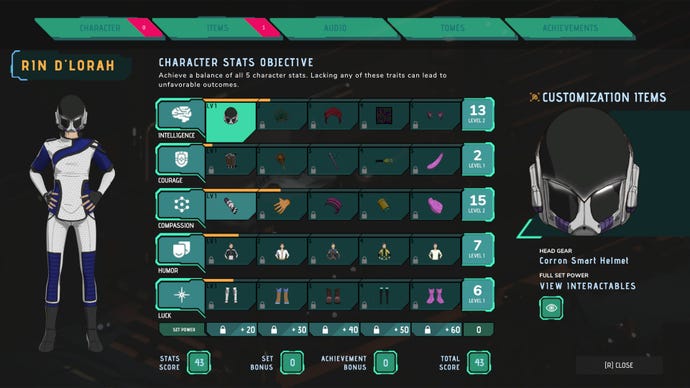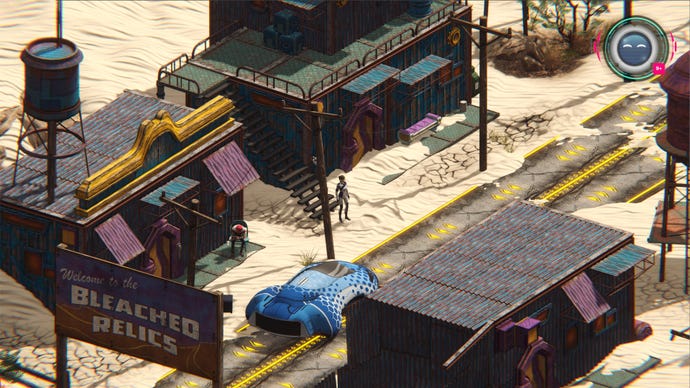Sky Of Tides is the anti-Disco Elysium in which balance is queen
In this lush sci-fantasy RPG adventure, min-maxing is a sin
Leonardo Da Vinci's
Vitruvian Man is a legendary drawing of a nude with his arms and legs reaching towards the rim and corners of a circle and square. It's often invoked as an archetype for the humanist worldview of Man the Measure and Centre of all Things, holding a perfectly proportioned universe in shape. Rin D'Lorah, the heroine of new narrative
RPG Sky Of Tides, is a bit like the Vitruvian Man, and the result is a game I find at once bewitching and powerfully offputting in its refusal to satisfy the conventions of the genre.
Created by Ontario-based Lofty Sky Entertainment, the game takes place in the sci-fantasy realm of Numen, which has been shattered into nine planetoids floating within the titular sky of tides, and is contested by two groups: the Syndicate, who run a monopoly on ancient magical tech, and the Sovereign, a rebel faction dedicated to the lost ways enshrined in the banned Numen Tomes. Rin is called upon to mend this ruptured civilisation while searching for her missing father. You'll do this not just by following the plot to its conclusion or levelling up, but by keeping Rin balanced as a character. For Rin, you see, has a peculiar gift of currently unexplained provenance: she's a mirror for everything else. Or perhaps, everything else is a mirror for Rin.
"She has the power to heal this broken world by becoming more balanced as a person," creative director Judith Cheung explains. "So you'll be making choices and you'll see your stats, but it's a little bit, I guess, 'anti' the RPGs in which you're trying to max and min your stats. We're actually trying to get people to become balanced by having like all their stats kind of going in sync, so that they can bring the world back together."
Rin's five character traits are intelligence, courage, compassion, humour and luck, which are increased via dialogue choices and collecting items or equipment of various kinds. In the average RPG, you're encouraged to concentrate on a couple of stats with a view to a particular playstyle. But in this case, you're expected to improve them all at an equal rate, so as to not only achieve but model within yourself the reconciliation of the setting's warring ideologies and energies.
Doing so has some immediate benefits: for each tier by which all of your stats increase you'll unlock bonuses and new powers, such as accelerated movement. Skewing Rin toward one or other trait might throw up some fun scenarios, initially, but the impression I get is that it'll eventually bring your playthrough to a premature halt, and in any case, it's very much against the developer's intention. If a location contains a certain number of objects that boost your traits equally, the preferred result is that you'll track down them all.


Image credit: ESDigital Games
What happens when the player favours one trait over the other? "One, you won't unlock things, and then two, in the end, you're not going to get a favourable outcome," Cheung says. "So each stat actually is linked to some kind of relationship or some aspect of the world. And if you're not in balance, maybe like your friend is no longer in your life, your father has died, the chairman who is this authoritarian figure maybe has taken over. So there's kind of different endings, and if you're completely balanced, then the player will get a chance to have the worlds come back together."
There's a character in Sky Of Tides who guides you through these metaphysical twists and turns, and there are also talking statues throughout Numen that sort of appraise your personal equilibrium in passing, as though X-raying your soul. "Depending on your stats, they'll say oh, you know you're really intelligent, but you're kind of a coward - that kind of thing." Sky Of Tides is divided up into chapters, and you can replay chapters if you find yourself out of balance. The game also has a "failsafe" feature that resets you a bit if you make a particularly ill-advised decision.
I find Sky Of Tides hypnotic inasmuch as if I understand the game correctly, I suspect I'm going to hate it. I routinely end up playing an all-rounder character in RPGs because I am hopelessly cautious and get ferocious FOMO about progression paths-not-taken, but I do feel that at their most engrossing, RPGs aren't supposed to be played that way. The point is to doodle in the margins of morality and practical capacity, to bend and twist personalities into keys for a simulation's worth of mishappen locks.
Won't there be times, I ask Cheung, where players find it much more satisfying to end up out of balance - flipping to the dark side and all that? "There will be some choices that give you like, access to different people and information about themselves. But in terms of like wanting to become unbalanced, I don't think we built that into the game - I think we are emphasising the balance."

Image credit: ESDigital Games
Cheung adds that the theme of balance reflects "our philosophy as developers as well", and cites her own academic research as an inspiration for the choice of character stats. "We wanted to do something like 'head', 'heart' and 'luck', because we kind of see luck as similar to virtue. I kind of study Eastern philosophy, and in some Eastern philosophies, virtue is actually a substance you accumulate by doing good deeds or enduring suffering, things like that, and how virtue can manifest in one's life is almost like luck - you just always seem to get a break, or you meet the right people at the right time. So that's the concept for luck. But in terms of intelligence and humour, those we associate more with like your mind, and then courage and compassion we associate that with the heart." Cheung comments later that "in Chinese, they tell you to walk the middle path. So you don't want to be too extreme in any other way."
The game's ideas about balance are pre-existing and imposed, it seems, rather than resulting from any particular set of beliefs and values you might encounter on the road. Rin always knows, on some level, what balance is, however much her experiences shape her. "I think it's kind of like a meta that's adjacent to like, her discoveries in the world," Cheung notes. "She's always trying to maintain the goodness that has always existed."
A lot of thought has gone into the metaphysical make-up of Rin and her world, then. But still, I find the game's emphasis on consolidating the "middle path" perverse. I'm intrigued to compare it with two other RPGs that loom large in my understanding of the genre, and which draw upon their own peculiar philosophical traditions. One is the recent Warhammer 40,000: Rogue Trader, which - as ever with Warhammer - is set in a universe of clownish extremes. There are no True Neutrals in Rogue Trader - the middle path is a foot-wide strip of gouged and bloodied No Man's Land. I don't think the writing quite nails it, in hindsight, but trying to walk that path is
an enjoyable challenge simply because that's really not how the setting would have you behave. I'm interested to discover if Sky Of Tides has a similar fraught chemistry: it doesn't really feel like it, given that Rin is established as a force for good from the outset.

Image credit: ESDigital Games
The other game - the one that is a direct inspiration on Sky Of Tides's visual presentation, as Cheung acknowledges - is
Disco Elysium. ZA/UM's game has minimal patience for the middle path in RPGs. It associates calls for balance with the privileged creed of centrism, that deceptively wimpy, crushingly civil, quietly draconian call for everybody to just somehow put aside their differences and rub along in an increasingly brutal and unjust world.
I'm not sure Disco Elysium's writers and designers would appreciate Sky Of Tides: this is a game that has a whole set of Option 4 dialogue responses dedicated to mocking players who refuse to take sides. But if the two games seem wholly unlike each other on this count (and in the tenor of the writing, with Sky Of Tides adopting an upbeat anime tone rather than Disco Elysium's flamboyant literary despair), they do share a Vitruvian geometry. They both take place in shattered worlds, with planetoids and isolas drifting apart, and they are both, in their own ways, trying to re-establish that world by means of the journey of a single character who is attempting to solve a mystery.
The key difference, I guess, is the degree of hope or anguish at work. In Disco, history and reality remain fractured and dispersed whatever road you take, however adroitly you play; in Sky Of Tides, it's seemingly possible to reach out, compose your limbs against the chaos, and push the universe into its rightful, perfect shape. I know which outlook I have more sympathy for, but they're fascinating to compare.
































![Have Many Potato [2013] Codex 2013](/forums/smiles/campaign_tags/campaign_potato2013.png)




